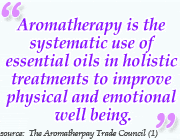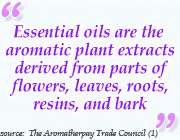Aromatherapy for beginners
More and more people are becoming interested
in aromatherapy and essential oils, and the beneficial effects they
can have on their lives, but how do they begin? Be reassured - you
do not need to have studied aromatherapy in depth before being able
to use certain essential oils safely and effectively.
To help those taking their first steps into
the wonders of aromatherapy, we have put together this
Frequently Asked Questions page on aromatherapy for beginners.
The article aims to answer a few of the frequently asked questions
about aromatherapy:
We also provide a few simple ideas on how to use essential oil:

First, however, a word of caution...
The essential oils supplied with Aroma4u™ products are 100% pure
and natural, but even natural products can have side effects if not
used properly, and some degree of care is needed when handling them.
Essential oils should not (in general) be used directly on the
skin. Do not take essential oils internally. Essential oils should
be kept away from children, pets and the eyes. Essential oils are
also very volatile and, therefore flammable - keep them away from
naked flames.
Aromatherapy products are never to be used in place of
medical treatment. If you are pregnant, epileptic, suffering from
high blood pressure or already taking medication, consult your
medical practitioner or a qualified aromatherapist.
All the essential oils supplied
with Aroma4u™ products are 100% pure (no synthetics or blends), are of the highest quality (for maximum
stress-relieving effect) and have been obtained from a member of the UK
Aromatherapy Trade Council.
For more information on the safety of essential oils, visit:

What is aromatherapy?
Although the term 'aromatherapy' didn't come
into use until about the 1900s, the use of essential plant oils to
promote physical and mental well-being and healing, has been
practised since ancient times.
With essential oils less is more - that is a
little can go along way. When applying the oils bear in mind that
the strength of aroma perceived will depend on your sensitivity to
that aroma, the size of the room, whether there is a window open,
etc.
We are all aware that certain smells can
trigger certain memories. Why is this? Our sense of smell is a
powerful thing, and the most over-looked of our five senses. When we
breathe in an aroma, the particles that make up the aroma bind to
the part of the brain that governs our sense of smell and emotions,
having an almost instantaneous effect on our
moods and emotions.
Inhalation is therefore the most direct route between our brains and
the outside world.
Different aromas (young living essential oils) can have different effects
on our moods and emotions, and essential oils, which contain the pure 'essence' of a plant and
are highly aromatic, have been found to have both psychological and
physical effects on our system.

What are essential oils?
Essential oils are highly concentrated,
natural plant products, long-recognized for their medicinal and
mood-enhancing effects. They are produced from specific parts of
particular plant species; for example,
lavender essential oil is produced from the flower, grapefruit
from the peel and eucalyptus from the leaf, and the range of
essential oils currently available is enormous.
 Want to know more ?
Want to know more ?

What should I look for when buying essential oils?
Essential oils are widely available, from
chemists, health shops, via mail order and on the Internet. For the
best effects, always buy pure essential oils; products containing
artificial ingredients will not provide the same degree of benefit.
Check the bottle carefully before you buy - just because the
labelling mentions the word 'aromatherapy' is not a guarantee that
the oils inside are pure and natural. Be wary of any product that
does not list its ingredients as being pure
essential oils
(especially if buying a blend of oils) or one that uses the word
'fragrance' on its label. Keep your oils away from direct sunlight
and in the container in which you bought them.

How do I use essential oils?
Essential oils can be used in a number of
different ways. The main ways are by inhaling their vapour or by
absorbing the oils through your skin during an aromatherapy massage.
Inhalation
This is the most effective and quickest way
to absorb the effects of essential oils into your body. Essential
oils are highly volatile, which means that they will vaporise into
the atmosphere even if you simply leave the bottle open or sprinkle
a few drops on a tissue. In order to speed this up and enable you to
inhale the aroma more quickly it is best to gently warm the oil.
Massage
This is a wonderfully relaxing way to
experience aromatherapy. The essential oil (or usually a blend of
oils) is diluted in a good quality carrier oil (such as almond oil,
or a good quality olive or other vegetable oil) and then gently
massaged into the skin. As a beginner, getting the right blend and
ratio of oils can be difficult and it is probably best to visit a
qualified aromatherapy practitioner to get the best effects, but you
or a partner can still get benefit from a gentle massage at home.
click here for some muscle tension remedies and/or blends for
that romantic mood such as lavender oils.

How can I use aromatherapy to relieve stress at work
Unlike many other approaches to stress
relief, essential oils can be used in the office (by inhalation) to
help relieve
work-related stress at its source.
Many types of aromatherapy diffuser are
available, but make sure that they are suitable for use in an office
environment.
A novel aromatherapy diffuser, specifically
designed for use in the workplace is the
Aroma Stress Buster™. This innovative aromatherapy
diffuser is small and compact, can be
attached to your laptop or
computer monitor (and so doesn't take up desk space or require an
electric socket) and releases aroma only into your personal space.
Easily personalised to suit your own taste, its range of
colours
and messages make it an attractive addition to your working
environment.









 Simple
essential oil remedies Simple
essential oil remedies
|
Essential oil* |
Uses |
What to do |
|
Tea tree |
Sore throat / mouth ulcer |
Add five drops of tea tree oil to a
cup of water. Gargle with a sip of the water for about 15
seconds then spit out. Repeat until all the water is gone. |
|
Lavender |
Stings / bites / minor burns |
Drop lavender essential oils (one
drop only required) directly onto the spot. Gently rub with one
figure tip (Note: This is one of the few times that it is OK to
use a pure essential oil directly on your skin.) |
|
Lavender |
Sleeplessness / insomnia |
Sprinkle 2-3 drops of lavender oils on your pillow just as you go to bed |
|
Lavender |
Anxiety |
Sprinkle 2-3 drops of lavender
essential oil onto a tissue and breathe in deeply for a few
minutes |
|
Rosemary / lavender |
Muscle aches and tension |
Massage the area gently with a blend
of rosemary and lavender diluted in a carrier oil, such as good
quality vegetable oil (1 drop of each essential oil in 1
dessertspoon of carrier oil). Other combinations you could try,
in the same amounts, are sage and eucalyptus or cypress and
thyme |
|
Lavender / ylang ylang / rose or
sandal wood |
General stress / tension |
Soak yourself in a long warm bath
containing 2 drops of lavender, 3 of ylang ylang, 2 of rose or 2
of sandalwood |
|
Eucalyptus |
Colds / flu / blocked nose |
Sprinkle 2-3 drops of eucalyptus
essential oils on your pillow just as you go to bed or on a
tissue to carry with you throughout the day |
|
Ylang ylang |
Romantic mood |
Sprinkle 2-3 drops of ylang ylang on
the bed or pillows. Ensure the room is warm, and use nightlights
for added romance |
*Use of good-quality essential oils only is recommended

Essential oils to aid work
|
Aids |
Suitable oils* |
|
Concentration |
Basil, Lemongrass |
|
Balance |
Pine, Eucalyptus |
|
Enthusiasm |
Basil |
|
Positivity |
Cinnamon, Orange, Grapefruit |
|
Assurance |
Pine |
|
Stimulation |
Orange, Grapefruit |
|
Rejuvenation |
Lavender oil |
|
Strength of purpose |
Cedarwood |
|
Focus |
Lemongrass, Cedarwood |
|
Confidence |
Eucalyptus, Rosemary |
|
Stability |
Rosemary |
|
Invigoration |
Cinnamon |
|
Relaxation |
Lavender |
*Use of
good-quality essential oils only is recommended

Stress-relieving essential oils
Essential oils that can help aid work related stress.
|
Symptoms/type of stress |
Suitable oils* |
|
Anxiety/worry |
Lavender, Pine, Eucalyptus, Rosemary |
|
Burn-out |
Basil |
|
Fatigue/tiredness |
Grapefruit, Basil, Rosemary,
Eucalyptus |
|
Road rage |
Lavender |
*Use of
good-quality essential oils only is recommended
References
- The Aromatherapy Trade Council.
www.a-t-c.org.uk/
|
![]()
![]()










